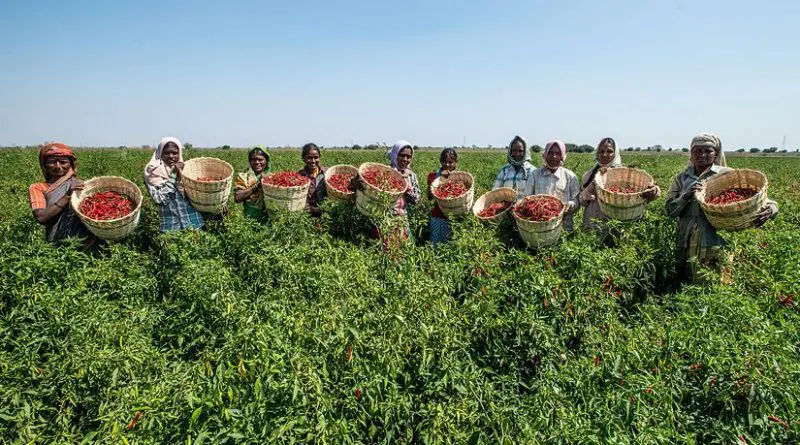Karnataka: With Judicious Use Of Water, Women Farmers See Health, Income Benefits
Hundreds of women farmers in rural Karnataka, India have been able to improve their lifestyle, both in terms of health and finance simply by using a measured amount of water in their cultivation, which has brought down pest attacks on their fields and thereby have stopped their dependence on pesticides.
This has happened with the intervention of SAMUHA, a Karnataka based organization working on various sustainable and development related issues, under a SAMUHA-Hindustan Unilever Foundation (HUF) project.
With a measured use of water in the agricultural fields, incidences of pest attacks have decreased and has paved the way towards Non-Pesticide Management (NPM) farming.
“After we stopped using pesticides in the agricultural fields, we received health benefits, as incidences of illness dropped sharply,” said Savithremma, a 26-year-old woman farmer from the Mustoor village in Gangavathi taluk of Karnataka.
Elaborating, she said that they used to apply the synthetic fertilizer Phorate in their agriculture fields —and used to apply 2 times in their 2 acres of cultivable land, and applied 5-10 kgs per acre.
She said that this used to cause health problems such as headaches and fever.
“Also since I and many like me used to work in the agricultural fields after chemical fertilizers are applied, ulcers used to be formed on our toes and used to cause a lot of problems,” she said.
However now that problem has disappeared, and she said she doesn’t have to go to doctors anymore, meaning she has been able to cut down on her medical expenses.
“Earlier I had to spend almost Rs. 1500 or so on doctors consultation fees and medicines in a season, but now that money is saved. This is a big relief for us,” she said.
She also said that after shifting to NPM farming, another benefit has been for the domesticated cattle belonging to the farmers.
“We are now able to feed the grass and weed from our fields directly to our cattle as those now no longer contain chemicals,” she added.
Women farmers such as Savithremma started benefiting in this way, after SAMUHA under the HUF project started to make farmers aware about NPM farming, and how to use of lesser water in agriculture to ensure that their cultivation were not attacked by pests.
SAMUHA, under the project, is running the Field Irrigation Channel program to ensure the efficient management of water, non-pesticide management in paddy crops.
Officials of SAMUHA have pointed out that this project has ensured several benefits for the farmers and one area has been regarding the improvement in the health of the women farmers and laborers.
SS Ghanti, a senior official of SAMUHA, said that earlier pesticides were mostly applied to get rid of the pests –Brown Plant Hopper (BPH), Stem borer, Leaf folder and Case worms.
“These pests have already come down to a great extent by using less and measured amount of water, and for this the farmers don’t need to use pesticides. Slowly many are starting to give up pesticide use and shift to NPM farming,” said Ghanti.
Another women farmer, Hanumanthi has also managed to reap similar benefits. A farmer from the Mundaragi village, Hanumanthi said that she also used to face a lot of health problems after working in the field as chemical fertilizers were used.
However after the concept of NPM farming started 5 years ago, life has changed for her.
She also works for other farmers on a daily wage basis.
“Earlier I and the other women farmers used to face problems including respiratory diseases, burning sensation, giddiness, and we had to rush to doctors very often. However that has changed now, we no longer have to visit doctors for these problem—which used to arise as a result of use of synthetic fertilizers,” she said.
Hanumanthi, who lost her husband over 10 years ago and is bringing up her two children on her own, was always worried about not being able to save enough.
“Now after turning to NPM farming—I don’t fall ill and so I don’t lose out on wages, and apart from that I am able to save over Rs 1500 per season, which I earlier used for medical expenses. Besides this now I am able to save more than Rs. 4000 a season as I don’t use chemical pesticides anymore,” she said.
“I am able to save additional over Rs. 5000 a year now,” she added.
Hanumanthi said that now she is getting a two way benefit—both in terms of health and wealth.
*Amarjyoti Borah is a journalist based in India and writes on issue of environment, climate change, agriculture and sustainable development.

